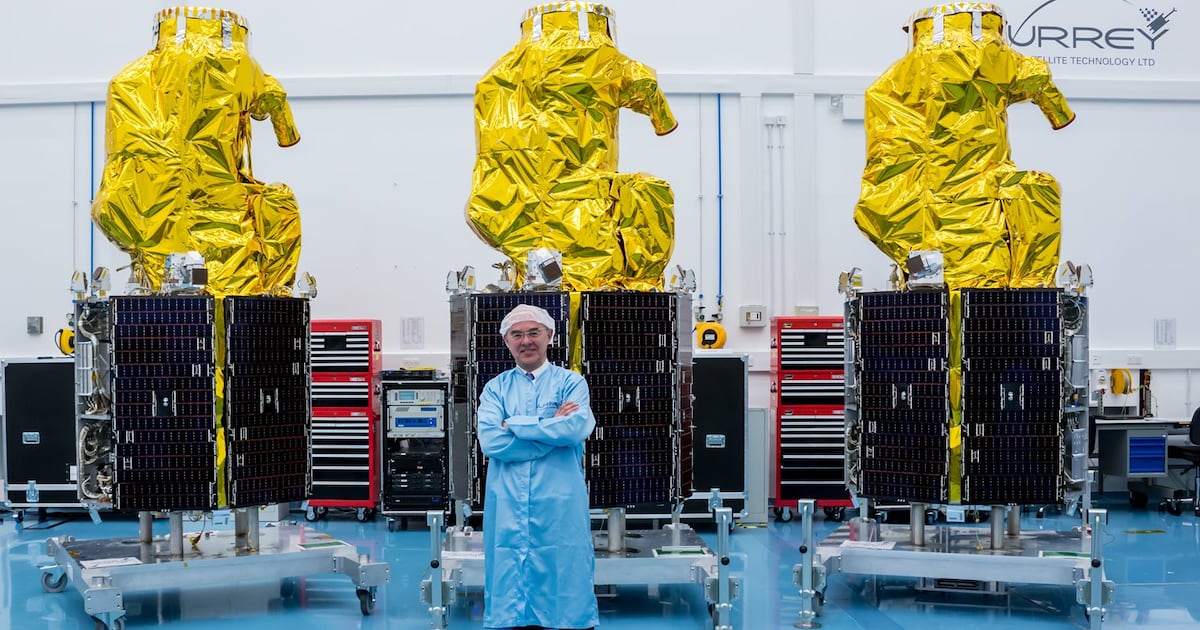Sir Martin Sweeting, a university lecturer in his late twenties, embarked on a remarkable journey when he constructed a DIY satellite that he successfully launched in 1981 at no cost.
Fast forward four decades, his fascination with deploying both machines and potentially humans in space remains undiminished. His company, Surrey Satellites, is at the forefront of establishing lunar orbiters that promise to provide Moon explorers with essential services akin to mobile phone coverage and GPS navigation.
Despite its seemingly local and unassuming name, Surrey Satellites has earned a stellar reputation in the space sector, primarily due to its track record of launching 72 spacecraft into orbit. With a workforce of 400 individuals and an impressive annual revenue averaging £75 million ($95 million), the company stands as a key player in the industry.
Prof Sweeting, though modest, is often regarded as a pioneering figure in the British satellite realm. His early satellite endeavors, including one that captured Earth’s images for eight years in space, laid the groundwork for the upcoming Moonlight spacecraft missions that are poised to revolutionize lunar exploration.
The evolving landscape of space exploration poses significant challenges, demanding precise engineering to mitigate unforeseen circumstances that could jeopardize missions. Prof Sweeting reflects on the transformative potential of space activities for humanity while acknowledging the associated risks.
Looking ahead to “Space 2075,” the focus shifts towards envisioning potential colonies and societies on other planets, notably Mars. The professor and his peers are delving into the implications of human habitation beyond Earth, contemplating governance structures, societal dynamics, and the necessity of proactive policy frameworks to address emerging challenges.
Inspired by the Apollo missions of the late 1960s, Prof Sweeting’s passion for space was ignited at a young age. His journey from amateur radio to satellite design underscores his innovative spirit and adaptability to emerging technologies.
As space endeavors diversify globally, the proliferation of satellites raises concerns about space debris and collision risks. Prof Sweeting advocates for responsible space practices and emphasizes the need for advanced technologies like AI to enhance satellite maneuverability and avert potential disasters.
The imminent lunar missions hold promise for discovering vital resources like water on the Moon, paving the way for sustainable lunar colonies. Surrey Satellites’ Lunar Pathfinder satellite aims to establish crucial communication and navigation infrastructure, heralding a new era of lunar exploration.
In a nod to future Mars missions, the Moon serves as a crucial testing ground for technologies and strategies essential for interplanetary travel. Prof Sweeting’s interactions with visionary figures like Elon Musk underscore the collaborative efforts driving space innovation and exploration.
Looking forward, Prof Sweeting anticipates the discovery of extraterrestrial life within the next decade, sparking profound questions about the diversity of life forms in the universe. His unwavering optimism and deep insights into space exploration hint at a future where humanity’s cosmic horizons expand exponentially.
